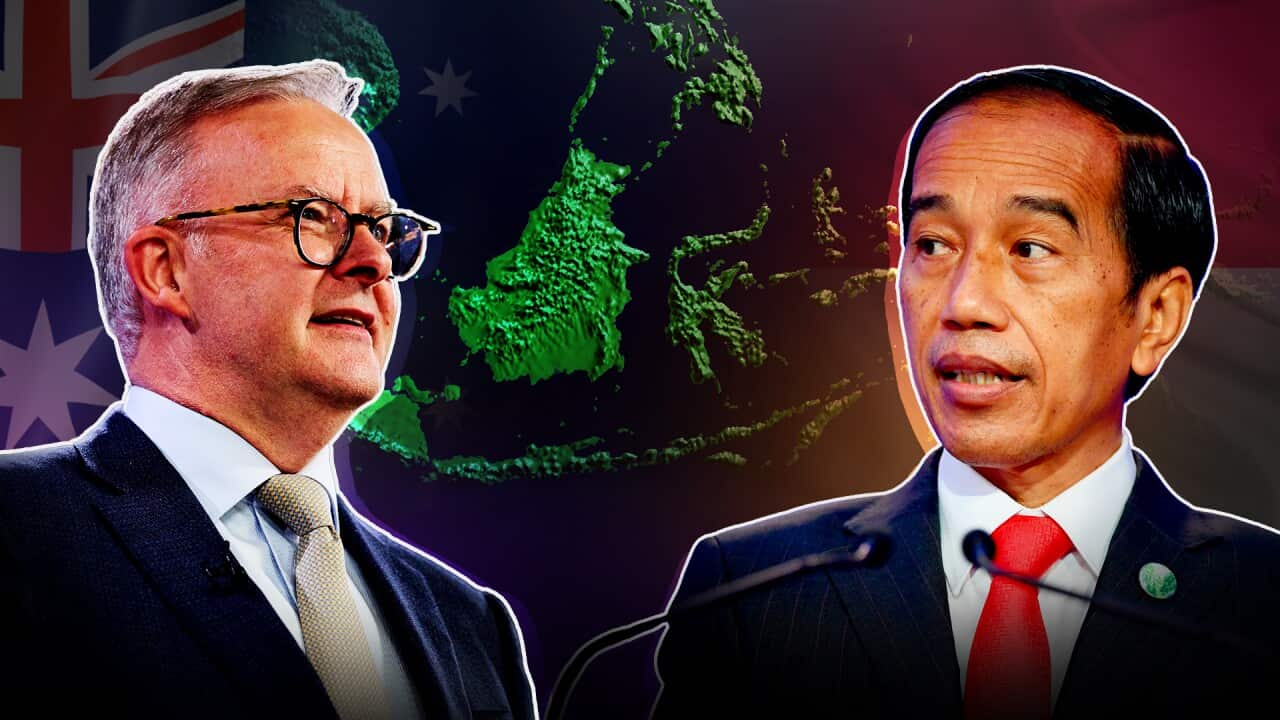Key Points
- Anthony Albanese has said strengthening ties with Indonesia an "absolute priority"
- Indonesia has a population of 270 million and is the world’s third-largest democracy
Prime Minister Anthony Albanese will fly to Jakarta on Sunday as he seeks to revitalise a new era for Australia’s crucial diplomatic relations with Indonesia.
Mr Albanese has said he wants to make enhancing ties with the South East Asian ally a priority of his government’s renewed focus on foreign policy in the region.
He will display this intent by making the trip to Jakarta just over a fortnight after his election victory.
Mr Albanese had intended this to be his first overseas visit, but this was overtaken by a trip to Tokyo for a Quad meeting days after being sworn in.
Emeritus professor Damien Kingsbury of Victoria's Deakin University said the relationship with Indonesia has historically been viewed as Australia's most important in the region.
“There's a theory in Australian international relations that if we can't get our relationship with Indonesia right, we can't get our relationship with anybody right,” he said.
“So this is an important meeting. I think it does signal that this government does want to have good relations in the region and in particular with Indonesia.”
Indonesia has become viewed as a traditional destination for Australian prime ministers since Paul Keating made it his first overseas visit in 1992.
Since then, John Howard, Kevin Rudd, Tony Abbott, Malcolm Turnbull, and Scott Morrison have all made the trip.
But Professor Kingsbury said not all prime ministers have been so “quick off the mark” in making the visit to the regional neighbour.
“I think this really does signal the new government’s international orientation,” he said.
“It's recognition that international affairs are becoming increasingly important to Australia's security and prosperity.”
Asked at the National Press Club before the election about his intention to visit Indonesia, Mr Albanese said he wanted to see closer engagement between the countries.
“Indonesia is so close - about to be a superpower in the world,” he said on 18 May.
“We need to really strengthen the relationship with Indonesia and that’s why it would be an absolute priority for me.
“Indonesia will grow to be an economy that’s substantial in the world, we live in a region whereby in the future we will have China, India and Indonesia as giants.
“We need to strengthen that economic partnership and one way I can do that is by strengthening people-to- people relations as well.“
Mr Albanese’s visit also marks the first visit to Indonesia by an Australian prime minister since Mr Morrison attended the inauguration of President Joko Widodo in October 2019.
However, since then there had been ministerial visits by senior members of the Morrison government.
This includes former foreign minister Marise Payne and defence minister Peter Dutton in September last year, while former trade minister Dan Tehan also visited later this month.
But the relationship hasn’t been without disagreement.
Indonesia recently voiced apprehension about Australia’s intention to acquire nuclear submarine technology through its AUKUS deal with the United States and Britain.
In September last year, Indonesia said it noted the deal “cautiously” and said it was “deeply concerned over the continuing arms race and power projection in the region.”
Mr Widodo is also likely to seek assurances from Mr Albanese that’s he'll attend the G20 leaders’ summit in Bali this November, alongside
'Can't afford to let the relationship slip'
The country’s President Joko Widodo - is also now facing his second and final term in power coming to an end in 2024.
Dr Melissa Crouch of the University of New South Wales said because of this there were “questions” about the pathway Indonesia is taking as a nation.
She described the choice for the prime minister to go to Indonesia on his first official visit as “strategic, important and necessary”.
“There is a lot of symbolism in these trips - [but] it should be followed by concrete tangible commitments to Australia’s relationship with Indonesia,” she told SBS News.
“Rather than looking at this visit in isolation, the question will be what substantiates the symbolism of this visit.”
Dr Crouch said Mr Albanese could learn from the Keating government’s investment in people-to-people engagement between the nations, which she said included a strategy to support language programs.
"It is in Australia's interests to ensure Indonesia remains committed to the democratic ideals," she said.
Indonesia, with a population of 270 million, is the world’s third-largest democracy and also has the world’s largest Muslim population.
The country is Australia’s 14th largest trading partner, with around $11.7 billion in two-way trade between the two nations as of 2018-19, according to Austrade figures.
But the bilateral relationship also spans strategic and security cooperation, maritime cooperation, as well as partnerships on counter-terrorism, stopping people smuggling, development and education.
The Albanese government has made early strides towards emphasising its focus on the region, with Foreign Minister Penny Wong already making visits to Fiji, Samoa and Tonga.
Senator Wong has sought to contrast a soft diplomacy approach from Australia, described as having “no strings attached”, with China’s attempts to assert its influence in the region.
She also warned last year the relationship with Indonesia was not “getting the attention on the Morrison government’s agenda that it warrants.”
Professor Kingsbury said Australia and Indonesia were united in sharing their uncomfortable stance toward China’s attempt to exert its influence in the region.
"We can't afford to let it [the relationship with Indonesia] slip particularly at a time when China is making inroads into the region," he said.
“Indonesia is wary of China's encroachments into the region and potentially could be an ally for Australia in the future should the strategic situation become more difficult."













